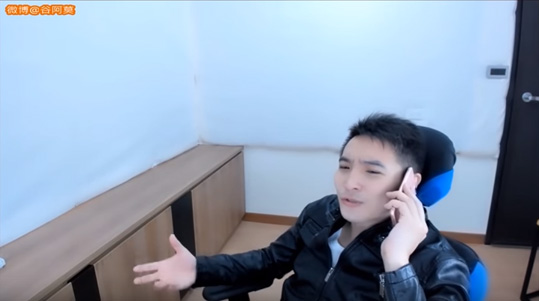A recent news article reported the case of a repeat-offending thief who stole instant noodles and bread from a supermarket four days after being released from prison. The prosecutor thought this constituted reoffending, and successfully applied to the court for his detention. However, why are Youtubers who are long-term infringers of film copyright unlikely to face the risk of detention, even if they receive a police summons?

One of Taiwan’s most prodigious YouTubers, AmoGood, who is facing charges for violating Taiwan’s Copyright Law; Source: YouTube.
The rules for “detention” in Taiwan are contained in Article 101 and Article 101-1 of the Code of Criminal Procedure. According to the verdict of 2017 Criminal Appeal (Zhikang) No. 14 at the Intellectual Property Court, “detention is a compulsory punishment measure wherein the accused is stripped of their personal freedom, essentially for the purpose of facilitating ease of procedure in criminal lawsuits, whether for the preservation of evidence or to ensure that a punishment can be carried out after the trial.”[1]
There are two main criteria for the first reason for detention, according to Article 101 of the Code of Criminal Procedure. The first is that there is substantial suspicion that the crime was committed and that prosecution, a trial or the rendering of punishment would be difficult without detention of the accused. The second is that detention should be carried out when one of three situations has occurred, these three being “cases in which the accused has fled or the facts suggest there is a risk of flight”, “facts suggest the accused will set fire to, forge or alter evidence or collude with co-conspirators or witnesses”, and “cases which involve the death penalty, life imprisonment or at least five years imprisonment and where there is reason to believe the accused may flee, burn, forge or alter evidence or collude with co-conspirators or witnesses.”
For Youtubers that consistently use illegally sourced content to give brief introductions of films, there is “substantial suspicion” that the crime was committed, but as long as they have no plans to flee the country and continue to make similar films domestically, the first criterion mentioned in Article 101 is not met. As to the second criterion, after the prosecutor has searched the place of production and confiscated the relevant video files, it’s unlikely that it would be met. Finally, according to Article 91 of the Copyright Law, the criminal behaviour that carries a maximum penalty of five years is either “A person who infringes on the economic rights of another person by means of reproducing the work without authorization with the intent to sell or rent” and “a person who commits the offense in the preceding paragraph by means of reproducing onto an optical disk”, neither of which accurately describes the behavior of Youtubers creating short films using infringing content and putting it on the Youtube platform. Therefore the third situation has not occurred either. Article 101 of the Code of Criminal Procedure cannot, as a result, be cited as a reason to detain Youtubers.
As to Article 101-1 of the Code of Criminal Procedure, it states that if the accused is “strongly suspected" and “there are facts sufficient to justify an apprehension that he may re-commit the same offense again”, then the accused “may be detained.” This prescribes detention for repeat offenders. However criminal behavior in violation of the Copyright Law is not included in the crimes listed in this article's provisions. Therefore, even if there are some Youtubers who are making a living out of infringing film copyright and consistently producing related films, they still would not be subject to detention under Article 101-1.
The Copyright Law Lacks a Prevention Mechanism for
Repeat Offenders
In fact, the offence of larceny as specified under Article 320 of the Criminal Code is among the repeat offences listed under Article 101-1 of the Code of Criminal Procedure. Article 320 states, “a person who for purpose to exercise unlawful control over other’s property for himself or for a third person unlawfully takes movable property of another commits larceny”. This behavior is extremely similar to copyright infringement, because using other people's copyrighted material without permission and deriving profit from it is called "piracy," which has the connotation of "stealing other people's copyrighted material.” If repeat offenders in the case of larceny should be subject to detention, then repeat copyright infringers should be treated the same way, as only then is there consistency in the protection of property rights in the criminal justice system. However, Article 101-1 of the Code of Criminal Procedure does not consider the criminal liability of copyright infringement, and the Copyright Law makes no provisions concerning detainment. This means that copyright law has criminal liability, but it does not make any provision to create a mechanism to prevent repeat offences, which means that even if a Youtuber is already embroiled in a criminal prosecution , they can continue to engage in infringing behavior.
This lack in the detention system, means that people who infringe the copyrighted content of films for a living are not prevented from continuing to infringe until a criminal verdict is handed down, which can be seen as a failing of the Copyright Law in protecting industry rights. Perhaps in the future there should be a revision to the law to add provisions on detention for copyright protection, to improve this failing in the Code for Criminal Procedure.
This article was translated from the original Chinese by Conor Stuart.
- See reason four of 2017 Criminal Intellectual Property Court Appeal (Zhikang) No. 14
|
| Facebook |
|
Follow the IP Observer on our FB Page |
|
|
|
|
|
|

